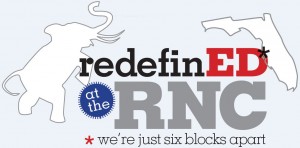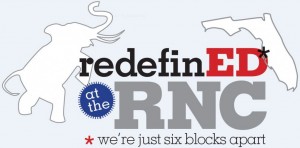 Bill Cosby has joined the board of directors of StudentsFirst, the education reform group founded by Michelle Rhee.
Bill Cosby has joined the board of directors of StudentsFirst, the education reform group founded by Michelle Rhee.
In a statement emailed to StudentsFirst supporters a few minutes ago, Cosby, a school choice supporter, wrote: "Enough is enough. I've seen the statistics on where American students rank in the world. I've heard the stories of children being sent off to schools that are nothing more than dropout factories, and our youth end up back out on the street uneducated and unprepared for life. I refuse to sit back and watch this happen. That's why I'm joining the board of StudentsFirst and will be working alongside you and StudentsFirst members across the nation to put children's needs first."
According to Education Week, StudentsFirst named other board members today, including Connie Chung, Joel Klein, Roland Martin and Jalen Rose.
Diane Ravitch called Cosby's move "the worst news of the day."
"This is a coup for her (Michelle Rhee) in her efforts to demean our nation’s teachers and promote the privatization of American public education," she wrote on her blog. "He is clearly uninformed about what she is doing. If you know how to contact him, do so. This is not in character for him."
 Andy Ford, president of the Florida teachers union, has done his darnedest to kick out many of the Republicans who continue to run both the executive and legislative branches in this state, and they don’t usually take a shine to his approach. Just the other day, Ford bought a two-page ad in Florida Trend, a leading business magazine, to proclaim: “IT’S MIDNIGHT IN FLORIDA. Do You Know Where Your Public Education Dollars Are Going?” He added: “The foundation of public education in the Sunshine State is devious, unreliable and crumbling before our very eyes.”
Andy Ford, president of the Florida teachers union, has done his darnedest to kick out many of the Republicans who continue to run both the executive and legislative branches in this state, and they don’t usually take a shine to his approach. Just the other day, Ford bought a two-page ad in Florida Trend, a leading business magazine, to proclaim: “IT’S MIDNIGHT IN FLORIDA. Do You Know Where Your Public Education Dollars Are Going?” He added: “The foundation of public education in the Sunshine State is devious, unreliable and crumbling before our very eyes.”
Given all that, you’d think Ford would be in a better mood at the Democratic National Convention in Charlotte. And you’d think he’d especially appreciate the speech from U.S. Education Secretary Arne Duncan, who spent much of his time criticizing Mitt Romney for gutting education spending “to cut taxes for millionaires and billionaires.” Even American Federation of Teachers President Randi Weingarten found some reason for cheer, tweeting, “Duncan: "teachers matter" and "no teachers should have to teach to the test"-very different from Romney/Ryan/Rhee agenda.”
Was Ford moved, too? Not so much. As the secretary wrapped up, he tweeted six words: “Glad Duncan is off the stage!”
 Fresh from Sean Cavanagh at Education Week, after interviewing Michelle Rhee at the DNC:
Fresh from Sean Cavanagh at Education Week, after interviewing Michelle Rhee at the DNC:
Rhee was skeptical of Republican challenger Mitt Romney's proposal to allow parents to use federal Title I and special-education money for private school vouchers.
While Rhee backs vouchers for impoverished students in academically struggling schools, she said there were far better strategies for large-scale school improvement than Romney's plan.
Universal voucher plans are not financially feasible, Rhee argued, especially given the state of the economy.
And a large-scale voucher plan like Romney is "only a sliver of what should be happen to fix the system," she said. "Unless you have a comprehensive set of policies, then that in and of itself is not going to have much of any impact.
Doug Tuthill's take on Michelle Rhee and her school choice evolution here. Researcher Matthew Ladner's take here.
 Mitt Romney hasn't talked much, if at all, about teacher pay on the campaign trail. But son Josh Romney raised the issue at an RNC event today, saying teacher pay has to rise in order to lure more top college graduates into the profession. Minutes later, George P. Bush, son of former Florida Gov. Jeb Bush, hit on the same subject.
Mitt Romney hasn't talked much, if at all, about teacher pay on the campaign trail. But son Josh Romney raised the issue at an RNC event today, saying teacher pay has to rise in order to lure more top college graduates into the profession. Minutes later, George P. Bush, son of former Florida Gov. Jeb Bush, hit on the same subject.
“I think you got to pay ‘em more. I think teachers need better salaries,” Josh Romney said in response to a question from NBC chief White House correspondent Chuck Todd. “I think you got to make it attractive for people who are coming out of college, the best and brightest coming out of colleges, who at this point say well there’s no way I can go into education, I can’t make enough money to feed my family or make a living. So I’m not going to go into education, even though I’d like to.”
When Todd followed up with a point about budget cuts, Josh Romney said this: “I think this is one of those areas where we can’t afford to cut back. Teachers need better salaries. And there’s obviously a lot of politics involved in there. There’s different ways to do it. But as long as it’s going to teachers … I think that’s the important thing.”
Josh Romney’s comments came at an event for young voters hosted by National Journal, The Atlantic and Microsoft. During a different segment of the program with a different moderator, George P. Bush also raised the issue.
“Teacher salaries have barely kept pace with inflation (while) administrative salaries have increased and exceeded that of the private sector,” said Bush, who lives in Fort Worth. “In Texas, what we’re witnessing is a true struggle between teachers unions and administrators over this issue. How is it that no one’s holding administrators accountable and yet we expect teachers to not only raise our kids but deliver superior results in the classroom?”
It’s unclear whether Josh Romney was referring to salary increases across the board or for pay hikes based on performance. His father’s education plan refers generally to rewarding teachers “who contribute most to student learning.” (more…)
 Michelle Rhee calls herself a “very, very, lefty liberal.” So what is she doing at the RNC in Tampa?
Michelle Rhee calls herself a “very, very, lefty liberal.” So what is she doing at the RNC in Tampa?
Building bridges.
“Despite the fact that I hold Democratic views on a lot of things, what I have found in my work on education advocacy and policy is that I often times find myself agreeing with, and getting the support of, Republicans,” she told redefinED after sharing the stage Tuesday with Jeb Bush. “And if I was a partisan person, then I would sort of eschew them and say no. But I’m about getting things done for kids. I’m about pushing policies that are in the best interest of children, and I honestly do not think we can accomplish that if we’re going to sort of stay on our side of the aisle. It has to be a bipartisan movement to do that.”
You can hear the full interview by clicking on the link below, but here are highlights:
On a centrist coalition in education: “Over the last five years or so, I have developed lots of good, strong working relationships with Republicans. And when I hear them talk in those meetings, I learn about what their priorities are and kind of what they want to do, and then I also go back to my own party and have those same discussions. There’s not a lot of difference between the two. And so, I know right now where the federal government is, is sort of you know, everyone’s staking out their positions and holding firm to those, but I actually think education could be the place where it would make the most sense for everyone to come together.”
On convincing other Democrats: “The only way to do that is to bring the conversation back to the level of children. And to ask people questions about what they would want for their own kids. Because if you go to any Democratic (function) – and trust me I go to a lot of Democratic circles and I talk about this stuff – and you bring up vouchers, people just go nuts. Or charter schools. Or even teacher tenure, you know. ‘Ohh, I can’t touch that.’ But if you take it down to the level of, ‘Okay, so if your child was in an ineffective teacher’s classroom, you’re just saying then that that would be ok? That would be okay if that teacher stays in the classroom the next year and your younger kid might get (placed there)?” They would say absolutely no way.”
On Obama’s education policies: “He has really been, I think, incredibly impressive. I never thought that I would live to see the day that a Democrat, a high-profile Democrat, much less a Democratic African-American president, saying the things he’s saying. He says I support the growth and expansion of charter schools. I support merit pay for teachers. We should recognize and reward the best teachers and for ineffective teachers, you need to find a new job. Those are the sorts of things that Democrats have never said.”
 Liberal Democrat Michelle Rhee and conservative Republican Jeb Bush shared a stage at the RNC in Tampa today and suggested that despite the hyper partisanship on so many issues, there is increasingly common ground when it comes to education reform.
Liberal Democrat Michelle Rhee and conservative Republican Jeb Bush shared a stage at the RNC in Tampa today and suggested that despite the hyper partisanship on so many issues, there is increasingly common ground when it comes to education reform.
“This is a chance for a Switzerland,” said Bush, the Republican Party’s standard bearer on education, referring to that country's policy of neutrality in wars.
Bush, who is giving a prime time speech at the RNC Thursday, said Mitt Romney will be a “very good president on education.” But he also praised President Obama and U.S. Secretary of Education Arne Duncan on their education initiatives, including Race to the Top. “This will be very heretic but I’m getting used to being heretical,” Bush said. “The president by picking Arne Duncan did a good thing for the country.”
Rhee, the former Washington D.C. education chancellor who now heads the advocacy group StudentsFirst, said it’s important to continue building bipartisan bridges to counter critics who will continue to try and sow division. “We have to fight really hard against that polarization,” she said.
Comments from the pair came after StudentsFirst sponsored a special screening of “Won’t Back Down,” the soon-to-be-released Hollywood movie about a mother and a teacher who use a parent-trigger-type law to turn around a struggling, inner-city school. They spoke before hundreds at the Straz Center for the Performing Arts along with the film director, Daniel Barnz, producer Mark Johnson and the moderator, former CNN anchor Campbell Brown. (Former Secretary of State Condoleezza Rice was also scheduled to be part of the panel, but could not make it because of the weather.)
Barnz and Brown also contributed to the nonpartisan atmosphere.
“This is not a partisan concern, this is an American concern,” Brown said after noting America’s high dropout rate and middling academic performance among other industrialized nations.
Said Barnz: “The movie makes an appeal for a kind of centrism … What I’d really like to see happen with the movie is to kind of strike a middle road.”
Rhee recalled that in D.C., former Mayor Adrian Fenty, a Democrat, put all of his political capital into backing her hard-charging plans to address low-performing teachers and schools. Fenty lost re-election, and Rhee resigned. Among the lessons learned, she said: critics were organized and able to quickly mobilize while “there was no equivalent political network on the education reform side.”
Both Bush and Rhee offered strong support for expanding school choice. With Bush, that’s no surprise given his longtime backing of private school vouchers, tax credit scholarships and charter schools. But Rhee is better known for tackling reforms like teacher tenure and evaluations. (more…)
Randi Weingarten must be watching the RNC goings-on pretty closely too. Minutes ago, the president of the American Federation of Teachers sent out a lengthy press release criticizing "Won't Back Down," the new movie about a mother and a teacher who use a parent trigger type law to turn around a struggling, inner-city school.
I mention the timing because StudentsFirst is sponsoring a special screening of the movie at the RNC this afternoon, followed by a panel discussion with Jeb Bush, Condoleezza Rice, Michelle Rhee and the movie's director, Daniel Barnz.
In her statement, Weingarten specifically mentions the parent trigger debate in Florida earlier this year. Here's an excerpt:
This movie could have been a great opportunity to bring parents and teachers together to launch a national movement focused on real teacher and parent collaboration to help all children. Instead, this fictional portrayal, which makes the unions the culprit for all of the problems facing our schools, is divisive and demoralizes millions of great teachers. America’s teachers are already being asked to do more with less—budgets have been slashed, 300,000 teachers have been laid off since the start of the recession, class sizes have spiked, and more and more children are falling into poverty. And teachers are being demonized, marginalized and shamed by politicians and elites who want to undermine and dismiss their reform efforts.
Parent engagement is essential to ensuring children thrive in the classroom. The power of partnerships between parents, teachers and the community is at the heart of school change.
But instead of focusing on real parent empowerment and how communities can come together to help all children succeed, “Won’t Back Down” offers parents a false choice—you’re either for students or for teachers, you can either live with a low-performing school or take dramatic, disruptive action to shut a school down.
At the RNC in Tampa this week, a small but bright constellation is scheduled to line up on education reform. Democrat Michelle Rhee, who famously tangled with teachers unions as schools chief in Washington D.C., will share a spotlight with Jeb Bush, who has praised President Obama’s ed initiatives, and Condoleezza Rice, who co-authored a Council on Foreign Relations ed report with Democrat Joel Klein. The panel will be moderated by Campbell Brown, the former CNN anchor who just got into a Twitter spat with Randi Weingarten. All will come together after a private screening of “Won’t Back Down,” a new movie that shows even Hollywood has embraced parental empowerment in education.
This will be a remarkable little event – a hopeful symbol of a centrist political coalition, in the midst of a red partisan sea, that is poised to take advantage of historic opportunities to re-shape the nation’s schools.
Poised, that is, unless it get chewed up by the fringes.
The Republican Party may be tilting even more right, but on education the centrists still hold sway. Jeb Bush, who supports a federal role for education, and backs national academic standards, remains one of the party’s leading lights on ed reform. His prime-time speech will likely generate more ink about education than anything else that happens at the RNC.
But obviously, there is tension. Rising Tea Party currents want to erode recent federal activism in ed reform – a position that so ironically leaves them pitching tents next to teachers unions. Their passion is well-meaning; their arguments worth considering. But their timing is especially bad: Reform-minded Republicans and Democrats are getting close when it comes to a common vision for public education – a vision that includes a healthy dose of school choice and bottom-up transformation. This rare alignment is mostly intact because the GOP led on education, and enough Democrats bucked their own fringes to shift the GOP’s way.
In a recent op-ed for redefinED, Margaret Spellings, the secretary of education under George W. Bush, didn’t call out Tea Party groups by name, but she didn’t mince words when it comes to the potential consequences of their aims: “This ‘unholy alliance’ between the unions and those who want no role for the federal government in education is propping up the status quo on the backs of our most vulnerable children,” she wrote. “It’s shameful beyond words.”
Mitt Romney and the ed centrists won a quiet victory in Tampa last week. They beat back attempts to restore an old plank in the GOP platform – eliminating the U.S. Department of Education. Tea Party linked groups got almost everything else they wanted. But according to Politico, instead of using the word “eliminate” in the draft language regarding the U.S. DOE, a subcommittee voted to replace it with a call to “support the examination and functions of.”
That’s a breather, but a temporary one. It should give added urgency to those in both parties who want to see constructive change and know more will get done, quicker, if centrists work together and find ways to grow their ranks. It’s important to remember that today, at the start of the storm-delayed RNC, before the spin makes every crack between Romney and Obama on education look like a canyon.
 Just a reminder: redefinED will be at the Republican National Convention in Tampa next week. Our offices are six blocks from away; how could we not be?
Just a reminder: redefinED will be at the Republican National Convention in Tampa next week. Our offices are six blocks from away; how could we not be?
We’re planning to cover anything and everything at the RNC, within our reach, that has to do with school choice and ed reform. The official schedule alone suggests we’ll be busy: Jeb Bush, Margaret Spellings, Michelle Rhee ... you get the picture.
So, look for a lot of blogging, probably even more tweeting. If you don’t already, check out our facebook page. On Twitter, follow us @redefinEDonline.
Editor's note: A response to Kelly's piece from redefinED host Doug Tuthill is scheduled to run tomorrow morning.
by Kelly Garcia
Fresh out of college, I was green about unions. I knew little about what they were and why they existed, yet I blamed many of the American education system’s woes on the powerful and bureaucratic teachers unions. Like most of my young and idealistic colleagues in Teach For America, I likened teachers unions to status quo. I resented them for that.
I also admired Michelle Rhee, a TFA alumnus, for her efforts to award Washington D.C. teachers for making achievement gains with their students. Performance pay was a concept that most union members did not support. I could not see the benefit of joining a union that was seemingly perpetuating the achievement gap by maintaining the system.
Over time, though, my black-and-white views about unions became more gray.
At the end of the first week of my first year of teaching, my roommate, a TFA corps member and a teacher in the Houston school district, came home to tell me she had met with a union rep at her school and joined the union. It seemed like an insult to her commitment to Teach For America, and to closing the achievement gap. I couldn’t make sense of her decision.
She explained she joined because teaching was a dangerous profession. At any time, a student or parent could make an accusation against her that could be career ending or have serious financial implications. She even shared a horror story of how the union helped save an accused teacher’s career and bank account after a student accused the teacher of sexual harassment.
Two years later, as I entered the public school system in Hillsborough County, Fla., I was invited to join the union for the first time. I declined. (more…)